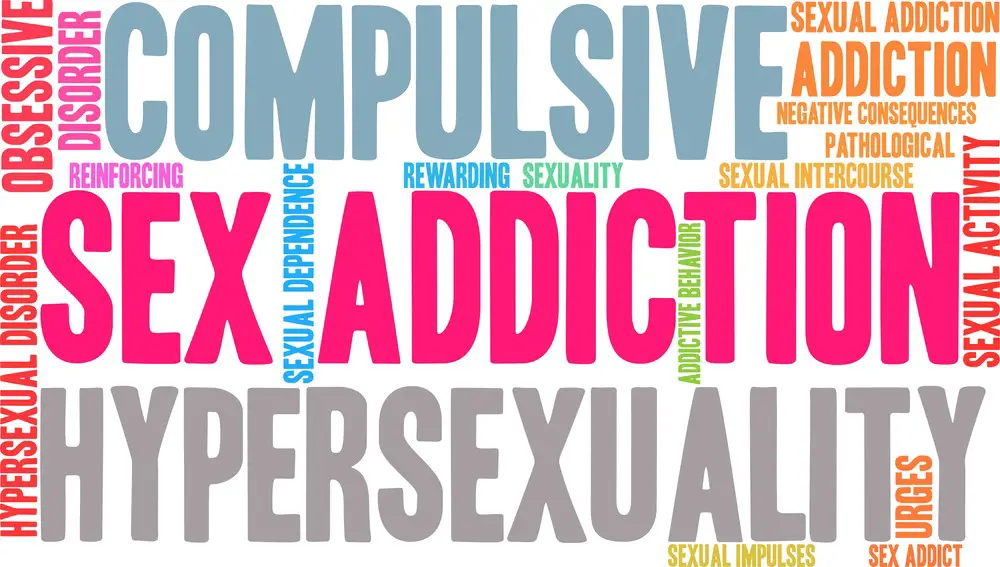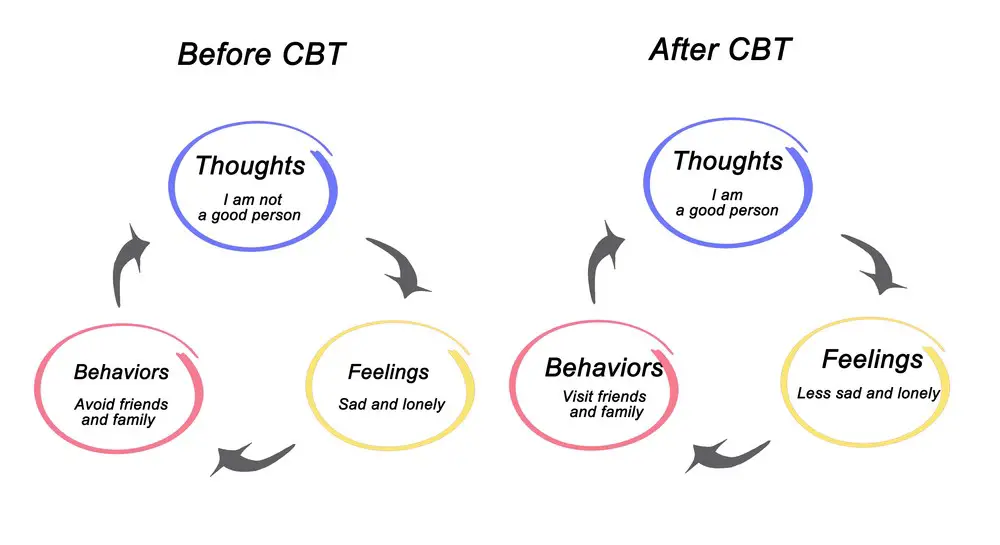As a BetterHelp affiliate, we receive compensation from BetterHelp if you purchase products or services through the links provided
Sex addiction is a complex and misunderstood behavioral disorder that can have far-reaching consequences on an individual’s emotional and relational well-being. Like other forms of addiction, those grappling with sex addiction may experience withdrawal symptoms when attempting to break free from their compulsive behaviors. Gaining a deeper understanding of sex addiction withdrawal symptoms is essential in providing appropriate support, navigating the recovery process, and ultimately achieving long-term freedom from this addiction.
Withdrawal symptoms for sex addiction can manifest in various ways, from physical discomfort to emotional distress and behavioral changes. These symptoms can be challenging to recognize and may initially appear unrelated to the addiction. It is crucial for individuals and their support networks to be vigilant when embarking on the recovery journey. Furthermore, the impacts of withdrawal on relationships, personal habits, and other aspects of life cannot be overlooked, as they may serve as triggers or impediments to progress.
Key Takeaways
- Sex addiction withdrawal symptoms can manifest in various ways, including physical discomfort and emotional distress.
- Recognition and understanding of withdrawal symptoms are crucial for successful recovery.
- Addressing withdrawal symptoms may require a combination of coping strategies, treatment options, and a strong support system.
 Understanding Sex Addiction
Understanding Sex Addiction
Sex addiction refers to a compulsive and uncontrollable engagement in sexual behaviors, despite the negative consequences it may bring. It is characterized by intense sexual impulses, irrational thoughts, and an inability to resist the urge to engage in these behaviors. It is important to note that sex addiction is not a mere interest in sex; it is a pervasive and harmful pattern of behavior that can significantly impact an individual’s life.
One common manifestation of sex addiction is compulsive sexual behavior, where individuals constantly need to engage in sexual activities, often through masturbation or multiple sexual partners. This compulsion may stem from various causes, including biological factors, childhood experiences, or coping mechanisms for stress and trauma. It is worth mentioning that sex addiction can coexist with love addiction, where individuals feel an intense need for affection and romantic relationships, sometimes leading to harmful behavior patterns.
Diagnosis of sex addiction can be challenging, as excessive sexual behaviors may not always indicate an addiction. It is crucial for mental health professionals to carefully assess the individual’s behavior, thoughts, and emotions related to their sexual impulses to determine the presence of an addiction. Some common criteria for diagnosing sex addiction include experiencing persistent and intense sexual fantasies, engaging in risky sexual behaviors, and feeling distressed or impaired by the sexual behaviors.
In terms of the causes of sex addiction, no single factor can be pinpointed. Rather, genetic, neurobiological, and environmental factors may contribute to its development. For example, individuals with a family history of addiction may be more susceptible to developing sex addiction. Additionally, neurobiological factors such as imbalances in brain chemicals or the reward system can play a role in the onset of compulsive sexual behaviors.
It is important for those struggling with sex addiction to seek help from mental health professionals, as the withdrawal symptoms can be challenging to cope with on their own. Therapy, support groups, and medication may aid in the recovery process, helping individuals gain control over their sexual impulses and lead a more balanced life.
 Withdrawal Symptoms Explained
Withdrawal Symptoms Explained
Sex addiction withdrawal symptoms can manifest both emotionally and physically. Those going through withdrawal may experience a range of feelings and sensations, which often vary in intensity and duration. Understanding these symptoms and their possible causes is crucial to better cope with them.
Individuals experiencing withdrawal from sex addiction often exhibit mood swings and irritability. These fluctuations in emotional state can be traced back to the brain’s attempts to regain a sense of balance after being dependent on the addictive behavior. Mood swings and irritability are natural responses as the body readjusts to life without the addiction.
Cravings are another common symptom experienced during withdrawal. The urge to engage in addictive behavior can be intense and may lead to feelings of desperation or even physical pain. As the body and mind have come to rely on the instant gratification provided by the addiction, the absence of this stimulation may cause these uncomfortable cravings. Over time, they will likely decrease in intensity, but support during this period is crucial.
Lack of energy, exhaustion, and physical pain are common physical symptoms experienced during sex addiction withdrawal. The body may have become accustomed to the constant surge of hormones and endorphins provided by the addictive behavior, so when this source is removed, it may result in fatigue and discomfort. Maintaining a healthy lifestyle during this time, including proper diet, exercise, and sleep, is important to help the body navigate these changes.
While some individuals might experience hyperactivity as a withdrawal symptom, others may notice decreased overall energy levels. This response contrast demonstrates how unique and varying withdrawal symptoms can be. Recognizing these differences will aid in understanding and coping with the withdrawal process.
In summary, withdrawal symptoms from sex addiction withdrawal are complex and varied. Both emotional and physical symptoms can arise, such as mood swings, irritability, cravings, lack of energy, physical pain, exhaustion, and hyperactivity. Understanding these symptoms, their causes, and potential coping strategies can go a long way in supporting those going through this difficult time.
Emotional Effects of Withdrawal
Sex addiction withdrawal can significantly impact an individual’s emotional well-being, with various emotional effects manifesting during the withdrawal process. One common emotional effect is heightened anxiety. As the individual ceases their addictive behaviors, they may experience an increase in anxious feelings and thoughts. This can be uncomfortable and distressing for the person in recovery.
Another emotional effect of sex addiction withdrawal is a deep sense of depression. The person may feel a loss of pleasure or motivation and may struggle with feelings of hopelessness. They may also experience loneliness as they distance themselves from their former addictive behaviors and the people associated with them. This loneliness can be exacerbated by shame and guilt associated with their past actions.
During the withdrawal process, it is common for the individual to experience waves of mixed emotions. They may feel a constant emotional discomfort as their mood shifts rapidly between anxiety, depression, and other emotions. This emotional rollercoaster can be challenging for the person in recovery, causing distress and making it difficult to maintain their commitment to recovery.
Sex addiction withdrawal may also provoke thoughts of suicide in some individuals. The emotional turmoil experienced during withdrawal can be intense, leading to feelings of despair and hopelessness. Those in the recovery process must seek support from mental health professionals or a support network to monitor and address suicidal thoughts.
As the individual works through their withdrawal, they may become preoccupied with their emotions and struggle with efficient decision-making or daily functioning. This preoccupation can interfere with work, relationships, and other aspects of life, increasing the individual’s overall stress and difficulties in navigating recovery.
Finally, during sex addiction withdrawal, the person may also exhibit increased hypersensitivity to their environment, emotions, and social interactions. This heightened sensitivity can make it challenging to cope with everyday stressors and may lead to an increased risk of relapse if not adequately addressed and managed.
In summary, the emotional effects of sex addiction withdrawal can be diverse and potentially cause significant distress and interfere with the individual’s recovery process. It is essential for those going through withdrawal to seek support from professionals or a network of peers to aid them in navigating these emotional challenges.
 Impacts on Relationships and Behaviors
Impacts on Relationships and Behaviors
Sex addiction withdrawal can significantly affect an individual’s relationships and behaviors. As an individual begins to cope with losing their addiction-related focus, they may experience intense cravings and impulses to engage in excessive or compulsive sexual activities. This can lead to relapse and sometimes result in multiple partners and cheating behaviors.
The impact of sex addiction withdrawal on relationships can be far-reaching. Trust, intimacy, and communication may all be affected as the individual struggles to cope with their cravings and impulses. The person may become defensive or aggressive as their behaviors are challenged, potentially creating conflict within a relationship. Moreover, there may be a significant emotional toll on the person with the addiction and their partner or family.
Additionally, the compulsive nature of addictive behaviors can lead to negative relationship patterns. An individual may prioritize sexual gratification above the needs and desires of their partner, placing additional strain on the bond between them. This can manifest in various ways, such as reduced quality time, increased secrecy, and dishonesty.
As the individual battles withdrawal, the effects on their behavior can become increasingly apparent. The constant fear of relapse may lead them to isolate themselves from meaningful relationships, further complicating recovery. However, it is important to note that recovery is possible, and strong support networks can be integral in overcoming addiction and its consequences.
In summary, sex addiction withdrawal can potentially impact relationships and behaviors in various ways. Trust, communication, and emotional well-being can all suffer, affecting the person struggling with addiction and those closest to them. Recognizing and addressing these issues is essential in fostering healthy relationships and achieving lasting recovery.
The Recovery Process
The recovery process from sex addiction withdrawal involves several crucial steps. Firstly, individuals must create a personalized recovery plan that addresses their needs. A well-designed recovery plan can guide them through overcoming addiction and maintaining good long-term health.
One critical factor to consider during recovery is stress management. Identifying and managing stressors can significantly reduce the likelihood of relapse. Developing a routine incorporating stress-reducing activities, such as meditation, deep breathing techniques, or mindfulness exercises, can help individuals cope with stress more effectively.
Identifying and avoiding triggers is another cornerstone of a successful recovery. Triggers can include people, places, situations, or emotions that may provoke addictive behaviors. Individuals must recognize their triggers and develop strategies for avoiding them or managing their impact.
Maintaining a healthy lifestyle is also essential during the recovery process. This includes proper nutrition, adequate sleep, and regular exercise. Engaging in physical activities can help improve overall health and well-being and produce endorphins that make it easier for individuals to manage withdrawal symptoms.
Developing coping mechanisms is a vital aspect of the recovery process. Individuals should explore diverse techniques such as seeking support from friends, family, or support groups, engaging in hobbies or activities that bring joy and fulfillment, and practicing self-care to reduce the temptation to return to addictive behaviors.
Lastly, individuals must maintain focus on their recovery. This can be achieved by setting achievable short-term and long-term goals that measure progress, help motivate and promote self-reflection on the journey toward overcoming sex addiction withdrawal.
 Treatment Options for Sex Addiction
Treatment Options for Sex Addiction
Sex addiction can be challenging to overcome, but various treatment options are available to those seeking help. Receiving appropriate and timely treatment can significantly improve an individual’s mental health and overall well-being.
One effective approach to treating sex addiction is therapy. A skilled therapist can help clients identify the underlying causes of their addictive behaviors while providing practical tools to deal with the compulsion. Cognitive-behavioral therapy (CBT) commonly focuses on identifying and changing unhealthy thought patterns and behaviors. Therapists may also recommend group therapy sessions, where individuals can find support and guidance from others experiencing similar issues.
Sometimes, medication may be prescribed to help manage sex addiction symptoms and compulsions. Selective serotonin reuptake inhibitors (SSRIs) are a common class of medications used, as they can help reduce obsessive thoughts and improve mood. Before starting any medication, discussing potential side effects and risks with a healthcare professional is crucial.
An essential aspect of recovering from sex addiction is recognizing its signs and triggers. Awareness of situations or emotions that prompt compulsive behaviors can help individuals develop strategies to abstain from such activities and maintain healthier relationships.
Furthermore, addressing related issues such as porn addiction may be vital in treating sex addiction. Like other forms of addiction, abstaining from pornographic materials can reduce compulsive behaviors and improve mental health.
In conclusion, various treatment options can support individuals struggling with sex addiction. Therapy and medication can be beneficial while learning to recognize signs and maintain abstinence can contribute to long-term recovery and improved mental health. It is essential to seek professional guidance and support to navigate through the process of overcoming sex addiction.
 Coping Strategies and Support
Coping Strategies and Support
When dealing with sex addiction withdrawal symptoms, it is essential to establish coping strategies and a strong support system. This approach aids individuals in navigating the potentially challenging consequences of withdrawal while reinforcing healthier choices.
One effective coping strategy is participating in support groups, such as Sex and Love Addicts Anonymous (SLAA) or Sex Addicts Anonymous (SAA). These groups provide a platform for people experiencing similar withdrawal symptoms to share experiences and offer encouragement. Peer support is invaluable when navigating difficult moments in recovery.
Practicing self-compassion is another crucial aspect of managing sex addiction withdrawal symptoms. Individuals should remember that recovery is a process, and setbacks are natural. By approaching their struggles with understanding and patience, they create a healthier foundation for lasting change.
Involving a psychologist or therapist with experience treating sex addiction is important for creating a personalized treatment plan. These professionals can guide individuals through withdrawal, offer insight into underlying issues contributing to addiction, and provide evidence-based coping strategies.
Building a supportive network of friends and family is essential for those battling sex addiction withdrawal symptoms. It is important to surround oneself with people who understand the challenges of addiction, provide encouragement, and positively influence recovery efforts.
Lastly, seeking professional help is necessary for addressing underlying emotional or psychological issues contributing to sex addiction. Individuals can uncover root causes and address them in a structured and safe environment by engaging in regular therapy sessions.
Combining these coping strategies and support mechanisms is vital in managing sex addiction withdrawal symptoms. By addressing withdrawal’s emotional and psychological aspects, individuals can pave the way for a successful recovery.
Understand the Connection: Sex Addiction and Other Addictions
Sex addiction, similar to other behavioral addictions such as porn and love addiction, is driven by the release of endorphins and dopamine in the brain. These neurotransmitters play a significant role in motivating and rewarding human behavior, often leading to addictive patterns.
Sex, porn, and love addiction share common withdrawal symptoms due to the decreased stimulation of the brain’s reward system. Individuals experiencing withdrawal from these addictions may display mood swings, irritability, depression, and anxiety as they abstain from addictive behaviors.
In cases of porn addiction, withdrawal symptoms can manifest as a result of abstinence from viewing explicit content. As the brain adjusts to the absence of continuous dopamine release, the individual may experience a range of emotions, including sadness and anger. Like sex addiction, the body may also crave pornography to achieve the previous emotional high, further exacerbating withdrawal symptoms.
Love addiction resembles sex and porn addiction regarding the brain’s chemical response. Those dealing with love addiction primarily seek the rush of endorphins and dopamine from romantic infatuations and new relationships. Withdrawal from this addiction can entail emotional pain, emptiness, and an intense longing for affection.
To summarize, the connection between sex addiction and other addictions, such as porn and love addiction, lies in the brain’s reward system and the neurotransmitters responsible for creating pleasurable experiences. Understanding these similarities and underlying mechanisms can help individuals effectively address withdrawal symptoms and develop strategies for lasting recovery.
Frequently Asked Questions
 What are the common physical symptoms of sex addiction withdrawal?
What are the common physical symptoms of sex addiction withdrawal?
Physical symptoms of sex addiction withdrawal may include fatigue, insomnia, headaches, and decreased sexual libido. Individuals may also experience flu-like symptoms like fever, chills, and muscle aches.
How long do withdrawal symptoms of sex addiction typically last?
The duration of withdrawal symptoms from sex addiction varies from person to person. Some may experience symptoms for a few days to a couple of weeks, while others may have symptoms that last several months. It is essential to remember that the recovery process is different for everyone.
Are there any mental symptoms associated with sex addiction withdrawal?
Mental symptoms associated with sex addiction withdrawal can include mood swings, irritability, anxiety, depression, and difficulty concentrating. These psychological symptoms may be challenging to manage and require mental health professionals’ support.
How can one cope with withdrawal symptoms from sex addiction?
Coping with withdrawal symptoms from sex addiction may involve practicing self-care, engaging in healthy stress-relieving activities, creating a support network, and seeking professional help from a therapist or counselor specializing in sex addiction.
What is the process of recovery from sex addiction withdrawal?
The recovery process from sex addiction withdrawal typically involves several stages, including acknowledging the issue, seeking professional help, creating a support system, and developing coping strategies to manage triggers and prevent relapse. It is crucial to remember that recovery is an ongoing process with occasional setbacks, and being patient and compassionate with oneself during this journey is essential.
Can therapy help in managing sex addiction withdrawal symptoms?
Yes, therapy can be an effective way to manage sex addiction withdrawal symptoms. A therapist may help individuals develop coping mechanisms, address underlying issues contributing to their addiction, and develop strategies for maintaining long-term recovery.
- Breaking the Silence: Why Men’s Mental Health Matters More Than Ever - April 15, 2025
- How to Transform a Home’s Patio Space into a Relaxing Space - March 23, 2025
- 5 Strategies to Use a Cell Phone to Help Manage Your Stress - March 23, 2025
This site contains affiliate links to products. We will receive a commission for purchases made through these links.


 Understanding Sex Addiction
Understanding Sex Addiction Withdrawal Symptoms Explained
Withdrawal Symptoms Explained Impacts on Relationships and Behaviors
Impacts on Relationships and Behaviors Treatment Options for Sex Addiction
Treatment Options for Sex Addiction Coping Strategies and Support
Coping Strategies and Support What are the common physical symptoms of sex addiction withdrawal?
What are the common physical symptoms of sex addiction withdrawal?
